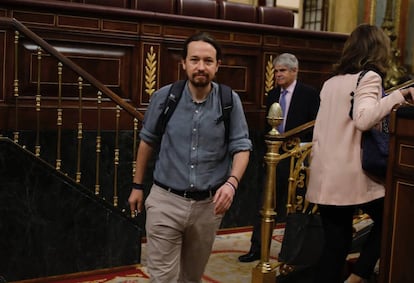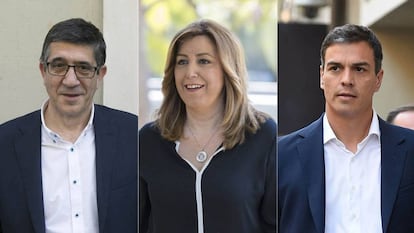Podemos to table confidence vote just 48 hours before Socialist primary
Party leader Pablo Iglesias to run as candidate to replace PM Mariano Rajoy, though success unlikely

The vote of no confidence that the leftist political group Unidos Podemos is due to present today in Spain’s Congress now has its alternative candidate for prime minister: pony-tailed Podemos party leader Pablo Iglesias. The proposal for the vote by the anti-austerity party, which was born out of the so-called 15-M popular protest movement in Spain in 2011, is motivated, according to Podemos, by the fact that Spain is “living in a state of democratic exception, with constant public looting,” in reference to the numerous corruption cases that continue to plague the governing Popular Party (PP).

The timing of the vote is significant, given that it will be formalized just 48 hours before the election of a new secretary general for the Socialist Party (PSOE) – Spain’s largest opposition party – at primaries due to be held this weekend. Candidates in that ballot include Andalusia regional premier Susana Díaz, former party secretary general Pedro Sánchez, who lost out at Spain’s two most recent general elections, and Patxi López, the one-time premier of the Basque Country.
The motion is doomed to fail as the three candidates for the PSOE leadership have said they will not support it
Pablo Iglesias announced his intention for a vote of no confidence on April 28, and since then has been negotiating with other political forces and consulting with its grass-roots supporters about the move. But since Monday there has been nothing to stop the party from tabling the vote, given that its voters assented to the maneuver. “The presentation of the motion is urgent,” said the party’s parliamentary spokesperson, Irene Montero, at a press conference on Tuesday. “The urgency is directly proportional to the urgency of the situation in which this country is living when the PP is feeding off the institutions.”
The motion will be tabled today, Friday, but without a candidate that has been agreed on by the other political parties. That said, under the Spanish Constitution, whoever emerges as the new PSOE leader could stand as a candidate, given that there is a two-day time frame after the motion is filed to present alternative candidates – that is, until Monday or Tuesday. For the debate of no confidence itself, a minimum of five days has to pass from the filing until it is held, but the speaker of Congress has the right to set the date it will eventually take place.

In a bid to display the support of the public for the vote of no confidence Podemos has organized a protest march in the center of Madrid for Saturday, chartering buses from all over the country to bring in supporters. The demonstration will take place from 6pm onward and will count on the participation of the main Podemos party leaders and their allies.
Regardless of this support, the motion is doomed to fail in parliament, given that the three candidates for the leadership of the PSOE have announced that they will not support it (accounting for 85 votes in Congress), although Pedro Sánchez has not ruled out presenting his own candidacy. The PP (governing in the minority, with 137 seats), Ciudadanos (32) and the Basque Nationalist Party (PNV) will also vote against the motion.
Unidos Podemos counts on the support of the left-wing, green Compromís coalition (four deputies) and 11 other votes from other smaller parties. For the no confidence vote to prosper, Podemos would need an absolute majority of 176 votes.
Spain is living in a state of democratic exception, with constant public looting Podemos
For years now, the PP has been mired in a serious of corruption cases, the biggest of which involved an alleged slush fund overseen by its former treasurer, Luis Bárcenas. However, over recent months a series of new scandals has come to light, the most recent of which involves Ignacio González, a former regional premier of Madrid, who is now being investigated for alleged irregularities while in office. The perception of a corrupt political class in Spain has contributed to the rise of new parties such as Podemos and Ciudadanos, who have campaigned on platforms promising to clean up Spanish politics. Their success effectively brought an end to the two-party PP-PSOE system in Spain that had been in place since the country returned to democracy toward the end of the 1970s, with little separating the PSOE and Unidos Podemos in recent opinion polls.
English version by Simon Hunter.
Tu suscripción se está usando en otro dispositivo
¿Quieres añadir otro usuario a tu suscripción?
Si continúas leyendo en este dispositivo, no se podrá leer en el otro.
FlechaTu suscripción se está usando en otro dispositivo y solo puedes acceder a EL PAÍS desde un dispositivo a la vez.
Si quieres compartir tu cuenta, cambia tu suscripción a la modalidad Premium, así podrás añadir otro usuario. Cada uno accederá con su propia cuenta de email, lo que os permitirá personalizar vuestra experiencia en EL PAÍS.
¿Tienes una suscripción de empresa? Accede aquí para contratar más cuentas.
En el caso de no saber quién está usando tu cuenta, te recomendamos cambiar tu contraseña aquí.
Si decides continuar compartiendo tu cuenta, este mensaje se mostrará en tu dispositivo y en el de la otra persona que está usando tu cuenta de forma indefinida, afectando a tu experiencia de lectura. Puedes consultar aquí los términos y condiciones de la suscripción digital.








































